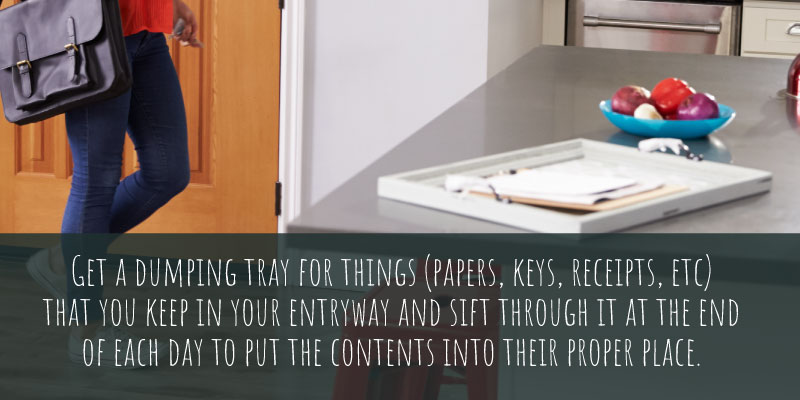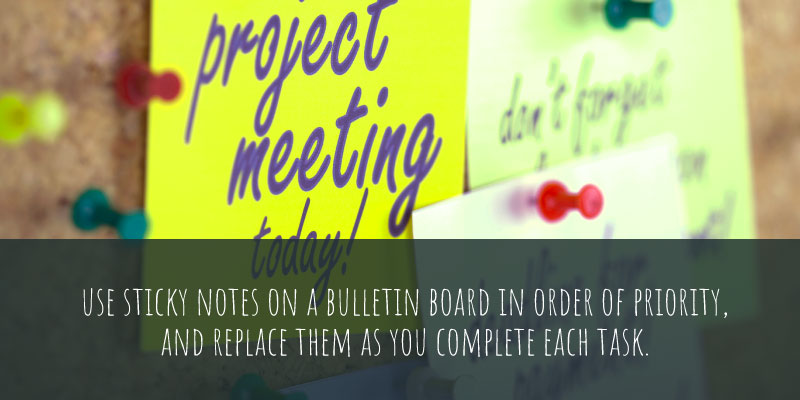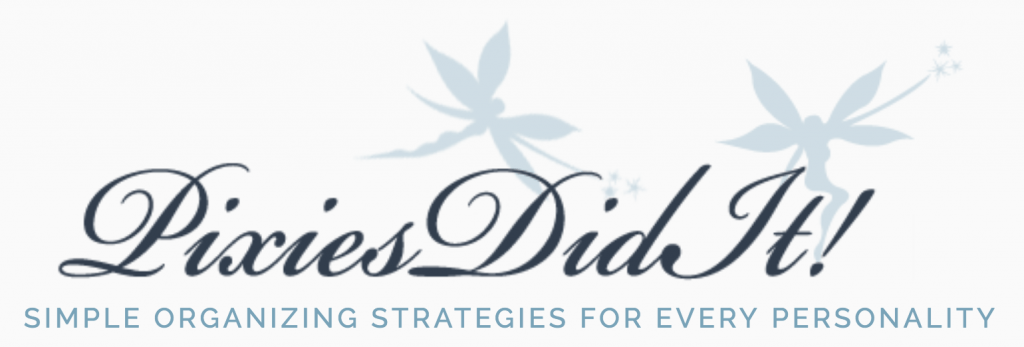How to Get and Stay Organized: Maintenance Tips for Every Type
What we have done as the founders of Pixiesdidit! is give you a way to get organized according to your personality type. If you haven’t yet gone onto our website and taken the Pixie Personality Quiz, we encourage you to do so. The more you know about yourself and the way you generally operate, the better of a chance you’ll have at navigating the process of home (and life) organization.
In our book, which is available on Amazon, we give you customized tips and tricks that will help you (as whatever type you turn out to be) adapt your lifestyle and way of doing things, to fit your natural way of being. In short, we give you ways of organizing that fit your personality type. For example, if you are what we call a Classic Structure, which is a naturally well-organized type A personality, we give you tips on how to best deal with other personality types (who may not be so tidy). AND we also give you tools to make living in your space as simple as possible. If you happen to be, say, an Organic Freedom, we give you tips on how to get organized to the best of your ability as just that, not how to become something different, like a Perfect Suzy Homemaker. Get our point? We work with YOU to provide realistic and workable organizational solutions that will seem easy and seamless to adapt to.

We teach you how to get organized, but we also teach you how to STAY that way. It’s one thing to have a wellspring of positive and productive energy at your disposal on day 1 of ‘This is the day I get organized’. But, what about on day 56? And so, in our book, our ways of getting organized are so simple that they are not only foolproof, but maintainable. Sustainable. And, most importantly, doable for you as the unique individual we are working to help.
In the following paragraphs, we will outline each personality type and the ways in which they can become organized and maintain organizational success. Just remember: organizational success is completely based on retrieval; whether or not you can find something you need when you need it (See the Pixie Principles outlined in our book for more info).
Type One: Classic Structures and Classic Freedoms
Classic Structures and Classic Freedoms are more outwardly organized than other types. They tend to keep calendars, write out their “To Do” lists, and have home offices where they keep their mail sorted and their bills in ‘paid’ and ‘unpaid’ labeled inbox bins. Of the two types of Classics, Classic Structures are more traditionally organized than Classic Freedoms, yet both tend to be routine-oriented creatures who run on a schedule. The only notable difference between these types is that one (Classic Structure) uses logic to make decisions and the other (Classic Freedom) tends to be more people-focused when making decisions. This means that Classic Freedoms have a bit more trouble letting go of clutter that could seem sentimental than Classic Structures do. Tips on maintaining organizational bliss include:
- Declutter on a regular basis to keep from overstuffing extra items into storage spaces.
- Beware of open storage. You like things to be closed up tightly to keep things looking ship shape. If you don’t have lids or tops for things, you will not feel successfully organized.

- Get a dumping tray for things (papers, keys, receipts, etc) that you keep in your entryway and sift through it at the end of each day to put the contents into their proper place.
- Make your home office a haven – but make it identical to a regular work office.
- Keep clutter/trash hidden with hidden trash bins (built-ins) and storage furniture (ottomans), as well as traditional filing cabinets. Mostly, give yourself TOOLS and containers to keep things looking and feeling organized, and make sure you PURGE regularly.
Type Two: Fun Structures and Fun Freedoms
These folks are terrific at spontaneous improvisation. In terms of organizing, if given the proper tools, they will use them — or make up organizational solutions themselves! Fun Structures are actually extremely organized naturally. This is because they are detail oriented people naturally skilled at decision-making in the moment. They are practical and pragmatic and excel at decluttering. Fun Freedoms are a bit more…loose and dependent on inspiration when it comes to getting things done. For these types, the biggest tips on how to maintain organization are:
- Find a way of making organizational tasks FUN and light.
- Process things like bills and paperwork in the moment.
- Do things like purging only when inspiration strikes. Otherwise, it will become associated with a chore and you’ll never want to do it.
- Color code everything- from file folders to clothing hanging in your closet. Make things visual-centric.
Type Three: Organic Structures and Organic Freedoms
These types are less traditionally organized than the other types. They need to see things to remember them. In general, they tend to make piles, so all they really need is something to help contain said piles. That, in itself, will be victory over half of their battles. They also like things to be out in the open. So we encourage open storage for this type. Though Organic Structures tend to be more routine-oriented and practical (they organize things pretty efficiently) they still need things to be out in the open to keep them straight. So, think open shelving in the kitchen rather than traditional cabinetry. Here are some tips to maintaining some of that well-earned organization once Organics have achieved it:
- Maintain an open storage plan: use open shelving, cubbies, and any other type of clear storage that allows you to see the inner contents.
- If purging is troublesome (or seemingly impossible), find someone to help you. Hire someone, or enlist a friend (who is ruthless and thus probably not an Organic type).

- Organic Freedoms, don’t invest in things like day planners. They too easily forget about them. Instead, use sticky notes on a bulletin board in order of priority, and replace them as you complete each task.
Type Four: Smart Structures and Smart Freedoms
Smarts in general are big thinkers and strategists who like to focus on the bigger picture — often people for whom organizational habits around the house are irrelevant. Or, at least seem that way. Smart Structures value their time and keep track of it well in the form of e-calendars, day planners, or personal assistants. Smart Freedoms have a much looser sense of real-time events and things, and instead have a brilliant skill of big-picture thinking. Being the visionaries that they are, Smart Freedoms are often so consumed by this big picture that they miss the seemingly mundane and petty details of how to get to that big picture in the first place. This includes the steps it will take to achieve their dreams. In order to succeed organizationally and maintain some sort of order in their busy lives, Smarts should:
- Keep piles contained in clear bins, giving the order that no one fiddle with them. Only you know the rhyme and reason to each pile.
- Use whatever organizational tools that work for you — so if you are a Smart Structure, use your day planner or e-calendar with regularity if it helps you stay focused and organized. If you are a Smart Freedom, keep things out in the open, and make recurring appointments (they are easier to remember than random ones).
- Create one-step organization techniques. For example, instead of coming into the bedroom and hanging your robe on the chaise or dumping it on the floor, put a hook on the back of your bedroom or closet door and hang it on that — it takes the exact same amount of time and effort and yet looks so much better (and cleaner).
With these tips and tricks, and with the help and guidance of our book, you ought to be able to find simple and easy ways to maintain the organization that you’ve worked so hard to create.
